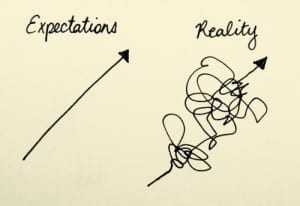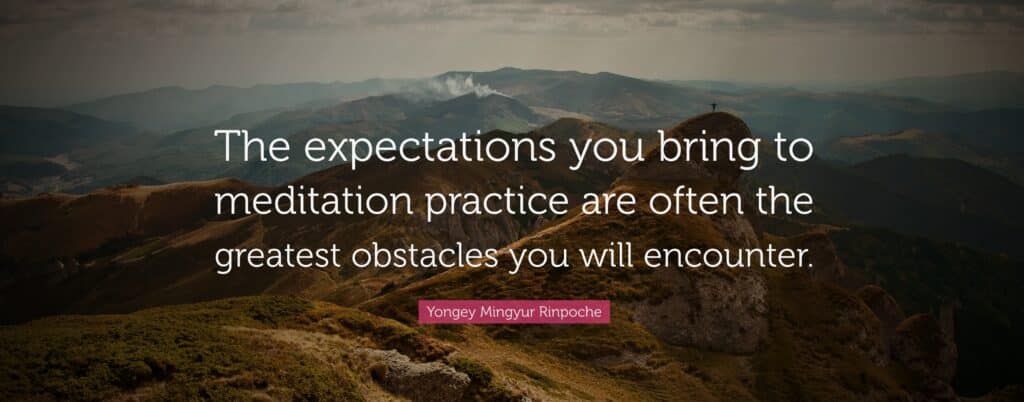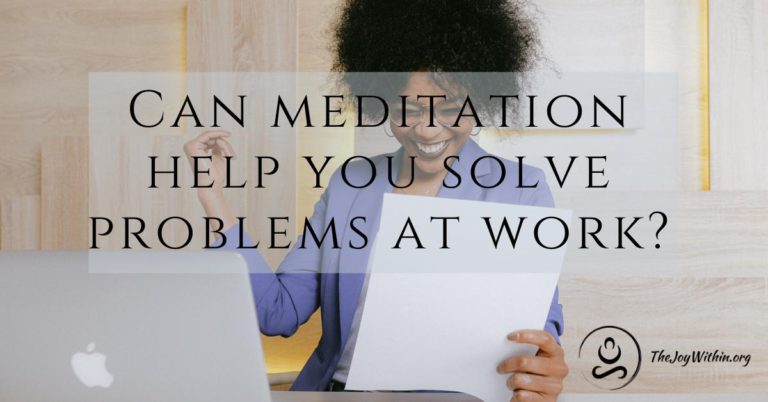
When you’re just getting started with meditation, one important, but often overlooked obstacle revolves around how you set expectations for yourself and your practice.
Some people think that starting a meditation routine is a cure-all for everything that’s wrong with their lives. Others try it out not knowing what to expect, only to find they can’t articulate why they’re meditating in the first place.
Believe it or not, either extreme can be a major roadblock that stops you from seeing significant results from your meditations. In this post, we’ll talk about how to overcome this hurdle, as well as a few tips you can use to make sure you set your sights on success.
Why Do You Meditate?

There are innumerable benefits to meditation, from scientifically proven health impacts, to more subjective ideas of spiritual awakening and enlightenment.
Because of this wide range of possible outcomes, meditation attracts a wide range of people, each of whom has a completely different goal in mind.
I encourage all students (beginners and advanced alike) to take the time to establish their own personal reasons for wanting to improve their meditation techniques. Understand why you want to meditate, individually, not just why you think you should, or what everyone else is telling you about how great the practice is.
Some of these reasons might include:
- Quiet the mind
- Reduce stress/anxiety
- Increase happiness/joy
- Find peace of mind
- Overcome guilt/regret
- Commune with God
- Experience enlightenment
- Create prosperity
These are just a few examples, but again, make sure you really think about your personal motivation, not just the reasons you think you should meditate.
Click here to view our current course offerings to help explore your reasons.
Setting Expectations from Yourself

When you understand your why, you can then take the next step of setting expectations for yourself.
At this stage, I’m not talking about goals or results you want to achieve through your meditation practice (or elsewhere in life, for that matter), but rather the expectations you have about what, exactly, you’re going to do.
How much time are you willing to spend meditating? What time of day will you meditate? Can you commit to this time consistently, every day?
Can you commit to this time consistently, every day?
How much time are you going to spend learning about your practice, for example by reading books, taking courses, attending seminars or group classes?
What do you already know about meditation? What do you expect yourself to know?
These are on-going questions for any student, but they’re especially important if you’ve never taken the time to consider them before. Focus on what you expect from you.
You want to find a balance between committing your time and energy to building a successful habit and going easy on yourself, recognizing that meditation is always a long term process. Start slow, and remember that the tortoise always beats the hare.
If this sounds confusing, or you’d like to get more guidance on how to set these goals, you can follow our 30 day Introduction to help you get started.
What To Expect From Meditation
The next area to set clear expectations has to do with the meditation practice itself.
The keyword to keep in mind here is patience.

A lot of people begin meditating only to find they are quickly frustrated by how ‘difficult’ it is. Before they begin, they think it will be simple to sit quietly for a few minutes and quiet their minds. Then, after a few tries at unsuccessfully stopping their thoughts, fidgeting endlessly, or wandering off to plan the next ten things to do that day, they become frustrated, and never commit long enough to see the real benefits of their practice.
A better approach is to understand going in that meditation is a process. Don’t treat it like you would a project you have to finish, with a set goal to complete in a specific amount of time.
Instead, think of it more like you would any skill. Like playing sports, learning a new language, or playing an instrument, you will never ‘perfect’ your practice. Gradually, you will learn how to focus your meditations more clearly. The beauty (and the joy) is in the process of learning how to go ever deeper within yourself.
Meditation does not have to be “difficult.” It can be as simple as taking a few minutes to breathe deeply. The “difficulty” comes only when you begin to set expectations about it. Trying to achieve any specific goal during your meditation can easily run counter to your aim.
Instead, you have to think about a completely different type of goal, based not on your ability to ‘succeed’ or ‘do’ anything, but one that empowers you to delve deeper into your meditations, every time you sit to meditate.
Fortunately, there is a clear, easy to follow system you can implement to do this.
Stay tuned for Part 2, How To Set Meditation Goals
Or, read more tips for starting your meditation practice.



